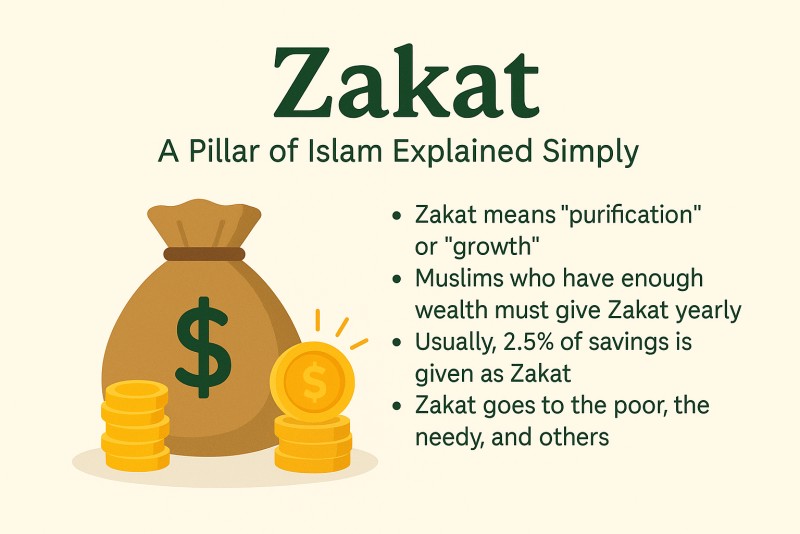
Zakat is a very important part of Islam. It is not just a donation or a good deed — it is a religious duty for Muslims. In this blog, we will explain what Zakat is, why it matters, how much to give, who should give it, and who can receive it.
---
What is Zakat?
Zakat means "purification" or "growth" in Arabic. In Islam, it is one of the Five Pillars, which are the main duties every Muslim must follow:
1. Shahadah – Belief in one God and Prophet Muhammad (peace be upon him).
2. Salah – Daily prayers.
3. Zakat – Giving to those in need.
4. Sawm – Fasting during the month of Ramadan.
5. Hajj – Pilgrimage to Makkah (if able).
Zakat is a form of charity, but it’s not optional like regular donations. If a Muslim has a certain amount of wealth, they must give Zakat once a year. It’s a way of sharing wealth and helping create a fair society.
---
Why Do Muslims Give Zakat?
Zakat has both spiritual and social purposes.
Spiritually:
It cleans your money and makes your wealth pure.
It shows thankfulness to Allah for your blessings.
It helps remove greed from the heart.
Socially:
It helps the poor and needy.
It reduces the gap between the rich and the poor.
It builds a stronger, more caring community.
---
How Much is Zakat?
Zakat is usually 2.5% of your total savings and wealth that has been held for one year.
For example:
If you have \$1,000 saved for one full year, you give \$25 as Zakat.
If you have \$10,000 saved, you give \$250 as Zakat.
---
What Wealth is Zakat Paid On?
Zakat is paid on many types of wealth, including:
Cash (in the bank or at home)
Gold and silver
Business income or goods
Investment profits
Stocks or shares
Agricultural products
Livestock (for farmers and herders)
---
When Do You Pay Zakat?
Zakat is paid once every lunar year. Many Muslims choose to give Zakat during the holy month of Ramadan, because the rewards for good deeds are multiplied.
You can choose a date each year (like 1st Ramadan) and check your total savings and assets on that date to calculate how much Zakat you owe.
---
What is the Nisab?
Nisab is the minimum amount of wealth a person must have before they are required to give Zakat. This amount is based on the value of 87.5 grams of gold or 612 grams of silver.
If your savings and assets are above the Nisab level for one full year, you must give Zakat.
> Example (based on today’s value – may change):
>
> If gold is \$60 per gram, Nisab is around \$5,250.
> So, if your savings are over \$5,250 for one full year, you owe Zakat.
---
Who Can Receive Zakat?
The Quran (Surah At-Tawbah, 9:60) explains eight groups of people who can receive Zakat:
1. The poor – People who have nothing.
2. The needy – People who have very little.
3. Zakat collectors – People working to distribute Zakat.
4. New Muslims – To help them start a new life.
5. People in debt – Those struggling to pay back loans.
6. In the cause of Allah – For religious or community projects.
7. Stranded travelers – Who need help returning home.
8. Captives or slaves – (This applied in the past when slavery existed.)
Zakat cannot be given to:
Your own parents, children, or spouse.
Non-Muslims (except in the case of a new Muslim).
The rich or people who do not need help.
---
Zakat vs Sadaqah
Many people ask about the difference between Zakat and Sadaqah.
| Zakat | Sadaqah |
| --------------------- | -------------------- |
| Required (obligatory) | Voluntary |
| Fixed amount (2.5%) | Any amount |
| Given once a year | Can be given anytime |
| Specific recipients | Anyone in need |
Sadaqah can be money, food, a smile, or any good deed. Zakat has strict rules, while Sadaqah is flexible and open.
---
Benefits of Giving Zakat
It brings blessings to your wealth.
It removes sins, like water washes away dirt.
It helps society and supports those in need.
It brings peace of mind and spiritual growth.
The Prophet Muhammad (peace be upon him) said:
> “Zakat is a right that the poor have over the rich.” (Hadith - Bukhari)
---
Final Thoughts
Zakat is more than just a donation. It is a duty, a right, and a blessing. It teaches Muslims to care about others and builds a more fair and compassionate society.
If you are a Muslim and have enough wealth, take the time to calculate your Zakat and give it properly. It could change someone’s life — and yours, too.
---



